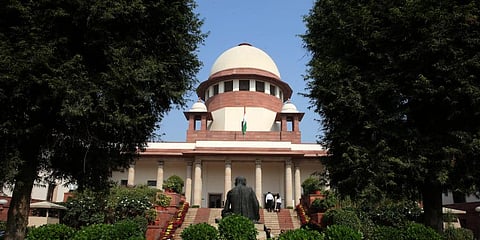

NEW DELHI: The Supreme Court on Tuesday struck down one of the provisions of the Benami Transactions (Prohibition) Act of 1988, which provides for the punishment of a maximum jail term of three years or a fine or both for those indulging in ‘benami’ transactions.
The Supreme Court termed the provision ‘unconstitutional’ on the ground of being ‘manifestly arbitrary’. “We hold section 3(2) of the Benami Transactions (Prohibition) Act, 1988 as unconstitutional,” a bench comprising Chief Justice N V Ramana and Justices C T Ravikumar and Hima Kohli said.
Section 3 of the statute deals with the issue of ‘Prohibition of benami transactions’ and its impugned sub-section (2) says: ‘Whoever enters into any benami transaction shall be punishable with imprisonment for a term which may extend to three years or with fine or with both.’
The top court said the continued presence of an unconstitutional law on the statute book does not prevent it from holding that such unconstitutional laws cannot enure to the benefit of or be utilised to retroactively amend laws to cure existing constitutional defects.
"In view of the fact that this Court has already held that the criminal provisions under the 1988 Act were arbitrary and incapable of application, the law through the 2016 amendment could not retroactively apply for confiscation of those transactions entered into between September 5, 1988, to October 25, 2016, as the same would tantamount to punitive punishment, in the absence of any other form of punishment," a bench headed by Chief Justice N V Ramana said.
The verdict came on the appeal of the Centre challenging the Calcutta High Court judgement in which it was held that the amendment made in the 1988 Act in 2016 would be applicable with prospective effect.
The centre had contended that the 2016 Act would be applicable retrospectively.
The 1988 Act was made to prohibit Benami transactions and the right to recover property that is held to be 'benami'.
"It is in this unique circumstance that confiscation contemplated under the period between September 5, 1988, and October 25, 2016, would characterise itself as punitive if such confiscation is allowed retroactively," the bench, also comprising Justices Krishna Murari and Hima Kohli, said in its 96-page judgement.
The apex court said that the legislature has the power to enact retroactive/retrospective civil legislation under the Constitution.
However, Article 20(1) mandates that no law mandating a punitive provision can be enacted retrospectively, it said.
"Section 3 (criminal provision) read with Section 2(a) and Section 5 (confiscation proceedings) of the 1988 Act are overly broad, disproportionately harsh, and operate without adequate safeguards in place. Such provisions were stillborn law and never utilized in the first place. In this light, this Court finds that Sections 3 and 5 of the 1988 Act were unconstitutional from their inception," the bench said.
The top court said that the taint of Benami transactions is not restricted to the person who is entering into the aforesaid transaction, rather, it attaches itself to the property perpetually and extends itself to all proceeds arising from such a property, unless the defence of innocent ownership is established.
"When such a taint is being created not on the individual, but on the property itself, a retroactive law would characterise itself as punitive for condemning the proceeds of sale which may also involve legitimate means of the addition of wealth," it said.
Concerning the provision of forfeiture under Section 5 of the 2016 Act, the top court said being punitive in nature, can only be applied prospectively and not retroactively.
"As this Court is not concerned with the constitutionality of such independent forfeiture proceedings contemplated under the 2016 Amendment Act on the other grounds, the aforesaid questions are left open to be adjudicated in appropriate proceedings," the bench said.
It also said its judgement on the Enforcement Directorate's powers under the Prevention of Money Laundering Act to take possession of a property before trial in exceptional cases leaves scope for arbitrary application.
A bench headed by Chief Justice N V Ramana said the ratio concerning Section 8(4) laid down by the PMLA judgement needs further explanation.
The apex court in its PMLA judgement delivered on July 27 had said that direction under Section 8(4) for taking possession of the property in question before a formal order of confiscation is passed should be an exception and not a rule.
Section 8(4) allows the ED to take possession of the attached property at the stage of confirmation of provisional attachment made by the adjudicating authority.
"In Vijay Madanlal Choudary & Ors v. Union of India, this court dealt with confiscation proceedings under Section 8 of the Prevention of Money Laundering Act, 2002 (PMLA) and limited the application of Section 8(4) of PMLA concerning interim possession by the authority before the conclusion of the final trial to exceptional cases.
"The court distinguished the earlier cases in view of the unique scheme under the impugned legislation therein.
Having perused the said judgment, we are of the opinion that the aforesaid ratio requires further expounding in an appropriate case, without which, much scope is left for arbitrary application," the bench, also comprising Justice Krishna Murari and Justice Hima Kohli, said.
The observations came in a judgement in which the top court held that Benami Transactions (Prohibition) Amendment Act, 2016, does not have retrospective application and the authorities cannot initiate or continue criminal prosecution or confiscation proceedings for transactions entered into prior to the coming into force of the legislation.
(With PTI Inputs)